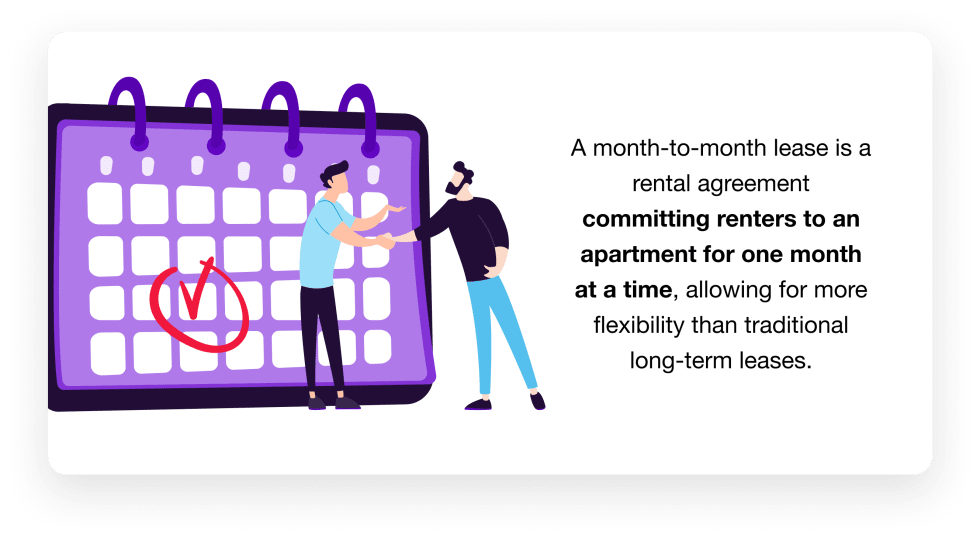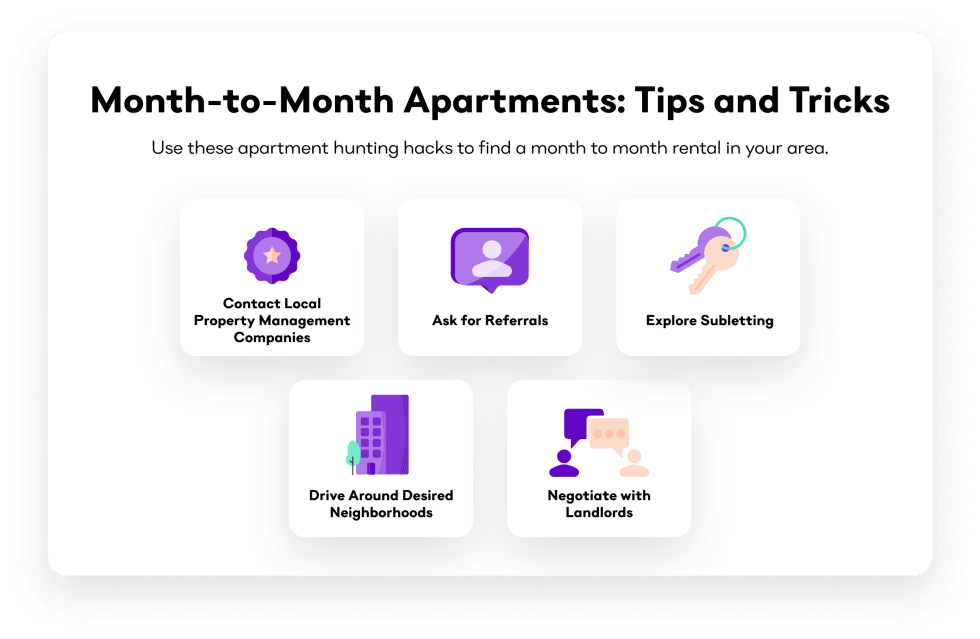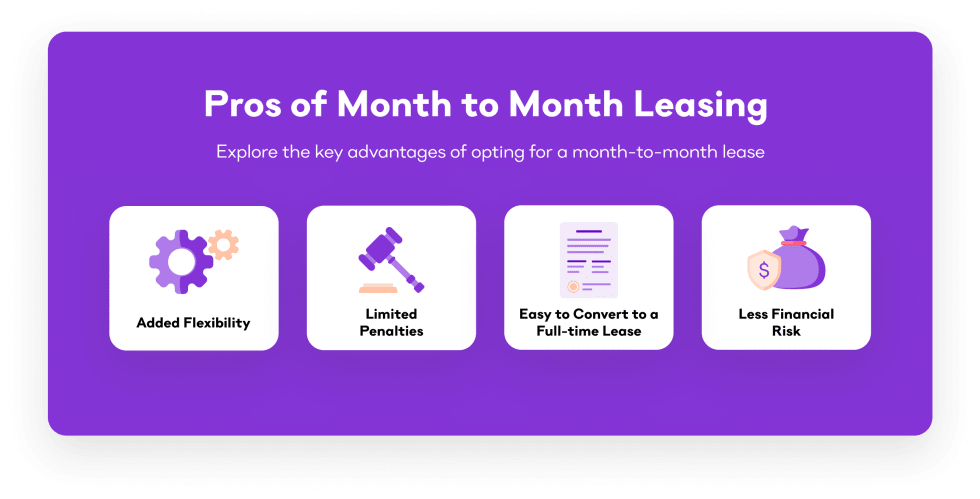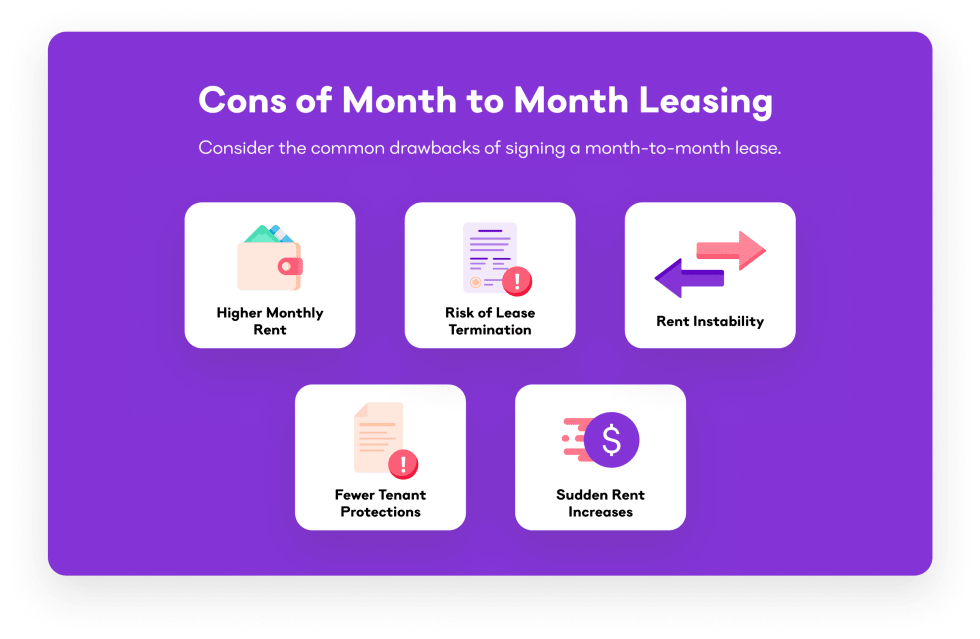Preston Centre
- 43 units available
- 1 bed • 2 bed • 3 bed
- Amenities
In unit laundry, Hardwood floors, Dishwasher, 24hr maintenance, Stainless steel, Walk in closets + more

Are you looking for a flexible housing solution in an ever-changing world? A month-to-month lease could be your answer. Ideal for those who move frequently or wish to experience a new city without long-term commitments these leases combine the convenience of short-term arrangements with the potential for long-standing agreements, adapting to both renter and landlord needs.
Discover how this unique living option fits into your rental journey through our comprehensive guide.
A month-to-month lease, often termed a 'periodic tenancy,' is a flexible rental agreement between a tenant and landlord without a predetermined termination date. This lease type renews each month automatically until either party, landlord or tenant, issues a legally-recognized notice to conclude the agreement.
While commonly associated with short-term rentals, month-to-month leases can extend for several years, especially in scenarios where the tenant-landlord relationship is stable and mutually beneficial. However, understanding your personal needs and the implications of a month-to-month lease is crucial in deciding if this type of rental agreement aligns with your lifestyle.

Month-to-month leases operate on an automatically renewing system, providing ongoing occupancy until either the landlord or tenant opts out. This type of rental agreement offers significant flexibility – it permits either the landlord or tenant to terminate the lease at any time, for any reason, subject to a stipulated notice period. This notice period varies based on state regulations and specific lease agreements, typically ranging from 30 to 90 days.
This notice period is critical as it allows the other party time to prepare for the change – landlords to find new tenants and renters to secure new accommodation. Understanding your notice period is essential in a month-to-month lease, as it governs how quickly you or your landlord can make changes to the rental situation.
When you fill out Apartment List's quiz and sign up to be matched with the right apartment, you'll be able to select the lease length that you desire. Additionally, you can return to your profile settings and update this filter at any time.
However, if you have your eye on a place that doesn't explicitly state that they accept month-to-month leases, it never hurts to inquire. You can use our internal messaging system to reach out to any landlord and ask about a month-to-month rental option. Here's a template you can use for that kind of inquiry:

Hello!
I am writing to express my interest in the apartment available at [Property Address] as I believe it would be a great fit for me. I am particularly interested in finding a flexible leasing arrangement, and I wanted to inquire whether you offer month-to-month leasing options. If month-to-month leasing is available, I would be grateful to hear more about the terms, rental rates, and any specific requirements you might have.
Additionally, I would be happy to provide you with any necessary information or references to facilitate the application process. Please feel free to contact me via email at [Email Address] or by phone at [Phone Number] to discuss the leasing options further or to schedule a viewing.
Thank you for your time.
Best, [Name]
Month-to-month rentals are increasingly popular thanks to the ever-changing rental and job markets. Here are a few factors contributing to the popularity of monthly leases:
Before you sign, make sure you understand the pros and cons of a month-to-month lease.

Understanding these pros and cons helps in deciding if a month-to-month lease is right; next, learn how to terminate one effectively.

Flexible lease terms are ideal if you’re about to experience a significant life change in the next few months, like a career move, relocating to a new area, expecting a child, or getting married. They are also a great way to try out an unfamiliar location.
Renters who purchase a home or undergo renovations also require a flexible lease. Or you may want to buy a new construction home with no set move-in date that requires a short-term place to live.
Terminating a month-to-month lease requires giving a formal notice to vacate letter, typically 30 days in advance, although this can vary based on local laws. It's crucial to adhere to the specific legal requirements in your area, including the method of delivering the notice - be it via mail, email, or in person. Ensure you have proof of this notice being received. After delivering the notice, we advise arranging a final apartment inspection to discuss the return of your security deposit and address any potential deductions.
This streamlined process ensures both parties - landlords and tenants - can conclude their lease agreement amicably and legally, avoiding any unnecessary complications. Always review your lease agreement and local laws for the most accurate guidance.
Now that we’ve answered “what is a month-to-month lease” is, you can decide if the flexibility is worth the trade-offs of higher prices and potential rent instability. If you’re already renting, you can speak to your current landlord about changing from a long-term to a short-term lease or take ApartmentList’s quiz to find the perfect rental for you.
Yes, a month-to-month lease is typically more expensive than a 12-month rental agreement. Some landlords that offer short-term leases also have a tiered rental system based on lease length, with the longest leases providing the most savings (and the shortest leases commanding the highest rental prices).
Yes, one of the drawbacks of a month-to-month lease is that rental price can be subject to increase. In most cases, a landlord can raise your rent to reflect market rates with a 30-day notice if you are on a month-to-month lease.
Failing to give proper notice may result in penalties, such as being responsible for an additional month's rent.
No, month-to-month leases automatically renew every month until one party legally terminates the lease.
A month-to-month lease is also known as a short-term lease or short-term rental agreement.
Periodic tenancy is a leasing arrangement with no specified end-date. Month-to-month leases are often an example of periodic tenancy. The renter can renew indefinitely as long as the landlord does not wish to terminate the agreement (and vice versa).
Tenancy-at-will is an arrangement between a landlord and tenant with no contract that can be terminated at any time. It differs from most traditional month-to-month leases in that there is no written contract between the landlord and tenant.




In unit laundry, Hardwood floors, Dishwasher, 24hr maintenance, Stainless steel, Walk in closets + more
In unit laundry, Patio / balcony, Granite counters, Pet friendly, Stainless steel, Walk in closets + more